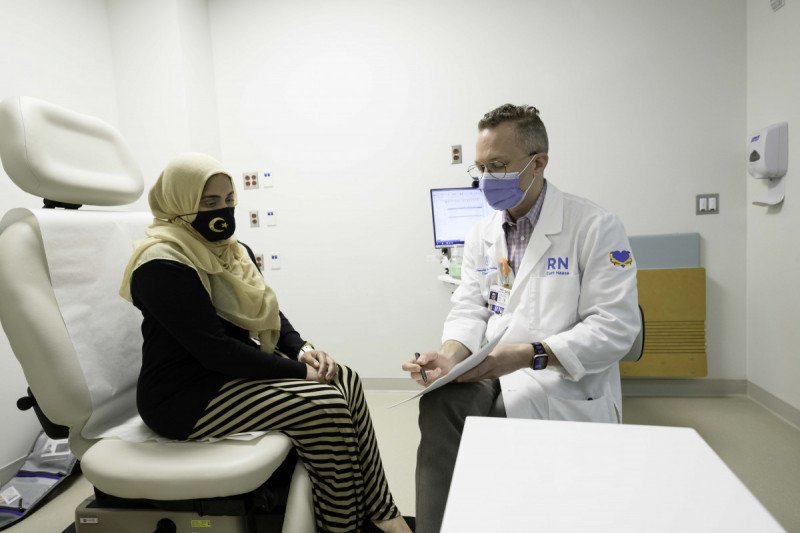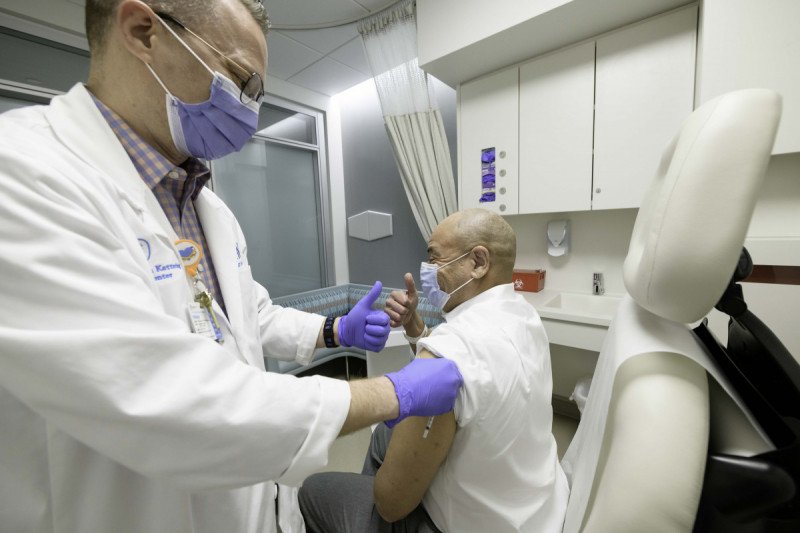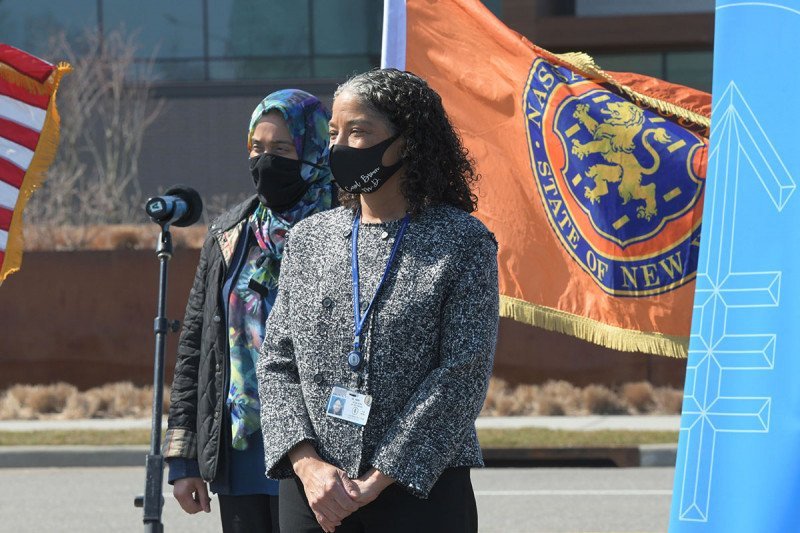COVID-19 vaccines represent a step toward ending the pandemic and getting back to a sense of normalcy after enduring more than a year of isolation, social distancing, and other measures to control the spread of the coronavirus. Yet, as the lifesaving vaccine has become more widely available, Black Americans are being vaccinated at a much lower rate than white Americans, according to one new analysis.
It’s a major challenge to overcome: Those who need the vaccine the most aren’t getting it — and they may have more barriers such as language, distance, and vaccine hesitancy.
“Communities of color have not only been among the hardest hit by the pandemic, but data also show poorer outcomes and higher mortality rates among Black and Hispanic/Latino patients with both cancer and COVID-19,” explains Carol Brown, Senior Vice President and Chief Health Equity Officer at Memorial Sloan Kettering. She plays a key role in leading MSK’s efforts to help reduce cancer health disparities experienced by medically underserved populations and expand their access to care.
To help address some of these health equity issues, a unique partnership was formed between MSK and the Nassau County Department of Health (DOH) in February 2021. As a first step, the organizations collaborated to launch a pop-up vaccine clinic at MSK Nassau. The clinic vaccinated 440 residents over the course of eight days between March 11 and April 20.
“This initiative is a great example of how a regional site, and specifically MSK Nassau, can give back to the community and partner with the local health department to provide essential care,” says Dr. Brown.
Vaccine Supply and Demand
When vaccines first became available in early 2021, very limited supplies made it challenging to book an appointment at the few sites that were offering vaccines on Long Island. The online system that was used to schedule appointments was also difficult to navigate at the time.
“If you happened to be online and an appointment popped up, then you could get one, but if you went on five minutes later, it would be gone,” remembers Carolyn McCummings, Commissioner of the Nassau County Department of Human Services. “And if people weren’t computer-savvy or became frustrated with the system, they might easily change their mind about getting vaccinated, especially if they were already apprehensive about it,” she adds.
Language barriers, misinformation about the vaccines, or simply not having a device to access the internet further hampered people’s desire or ability to make an appointment.
Eager to address these issues and make it less daunting for community residents to make an appointment, an educational outreach campaign was initiated by the Nassau County Vaccine Equity Team, which includes the Office of Human Services, the Office of Minority Affairs, the Office of Hispanic Affairs, and the Office of Asian American Affairs. They reached out to their constituents through community organizations and local businesses and began to identify names of thousands of county residents who wanted to get vaccinated.
“Our goal was to set people up with an appointment as quickly as possible, but we needed additional venues to accommodate more residents,” says Dr. McCummings. “We didn’t want people to put their name on this list and then wait two or three weeks for us to call them.”
Shared Goals Lead to Collaboration
At about the same time, Dr. Brown had begun to initiate ways for MSK to reach out to communities of color to raise awareness around their risk of worse outcomes from COVID-19 and cancer and encourage them to get vaccinated.
She connected with Dr. McCummings and the partnership between MSK and the Nassau County DOH was born. They agreed that the first joint project would be to launch a pop-up vaccine clinic at MSK Nassau. The county would supply the vaccine and book the appointments for the residents, and MSK Nassau would provide the staff and resources needed to operate the clinic.
A Precious Commodity for the Community
Over the course of eight days, more than 25 nurses, eight pharmacists, and 10 care coordinators from MSK volunteered to staff the pop-up clinic, which ran much like an MSK outpatient clinic. The MSK team worked very closely with Raina Townsend, Community Liaison Specialist at the Office of Human Services at the Nassau County DOH. Her responsibilities included scheduling residents’ appointments and filling any last minute cancellations with people on the waiting list. According to Dr. McCummings, not one dose of vaccine has been wasted at any of the vaccine pods running in Nassau County, and the DOH wanted to make sure this project was equally successful.
MSK pharmacists played a critical role as well. “We handled the vaccine as a precious commodity, carefully counting how much we dispensed throughout the day so that we stayed on target,” says MSK Nassau pharmacy manager Anthony Zinga, who also coordinated with Nassau County to transfer their vaccine supply to MSK Nassau.

Standing, from left: Diana DeNapoli, assistant manager in Outpatient Operations; Christy Manso, community programs manager; Anna Giallo, clinical nurse; Joanne Olson, clinical nurse; Raina Townsend, Community Liaison Specialist at the Office of Human Services at the Nassau County DOH; Tamisha Walker, manager in Outpatient Operations; and Laura Connolly, executive assistant to Carol Brown. Seated, from left: Carol Brown, Senior Vice President and Chief Health Equity Officer; and Carolyn McCummings, Commissioner of the Nassau County Department of Human Services.
Getting to Know MSK Nassau
The vaccine clinic also provided a way for the staff at MSK Nassau to become better known in the community. “With COVID, everything became virtual, and it was harder to engage with residents, but the clinic was an opportunity to bring people in and remind them of MSK’s presence here. It spoke to our commitment to them,” says Kerrie D’Aguilar, Associate Director for Ambulatory Care for MSK on Long Island.
“The nurses who took care of us were excellent! They were very patient, supportive, and knowledgeable,” says Farrah Mozawalla, a Woodbury resident who received both doses of her vaccine at the MSK Nassau clinic. “The facility was inviting and welcoming and easy for people to access.”
For MSK staff, the positive feedback was mutual. “It’s been one of the highlights of my career to be part of this great team effort,” says Anna Giallo, a clinical nurse at MSK Nassau. “The public and our staff really needed this after the year we had. Grandparents who came in would tell me, ‘I haven’t seen my grandchildren in over a year and the vaccine is going to allow me to see them again.’ It was heartwarming to know that we were helping people reconnect with their families and take a step forward out of this pandemic.”
Adds Dr. Brown, “People got to see firsthand the special care that we give to our patients.”
Building on the Partnership
Dr. Brown and her colleagues at MSK appreciated the opportunity to work with Dr. McCummings and the entire Nassau County team, including Nassau County DOH Commissioner Lawrence Eisenstein, Deputy County Executive Kyle Rose-Lauder, and Office of Health Equity Director Andrea Ault-Brutus.
MSK is eager to do more. The next phase of the partnership is focused on building confidence among community members who may still be hesitant about getting vaccinated. This will include an educational Town Hall webinar to address any misinformation and questions that people may have around the vaccine and its safety.
“This partnership between government and private industry is something good that has come out of the pandemic, and we’re excited to continue working together to sustain it for as long as possible,” says Dr. McCummings.
There are also future plans for MSK and the Nassau County DOH to increase cancer screening, education, and awareness in the community. “We want to improve the health of underrepresented communities on Long Island and help get people screened, and if they’re diagnosed, help get them get the care they need,” adds Dr. Brown.







